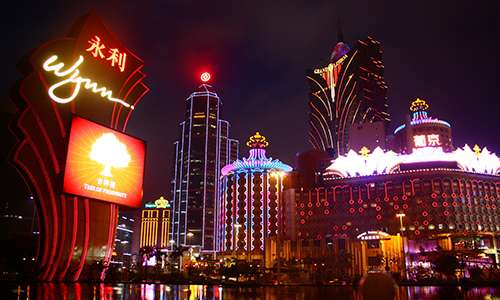Macau Gambling Slide Continues as China’s Gamblers Seek Alternatives
China’s ongoing crackdown against illegal gambling and junketeering operations continues to be felt in Macau, where the latest year-over-year revenue numbers leave unchanged a year-and-a-half long trend that’s now chopped away nearly 40% of all of Macau’s gaming revenue.
 The crackdown, first announced in February of 2013, was centered in a half dozen of China’s largest cities, focusing on junketeers serving as financial go-betweens offering the equivalent of off-the-books, short-term loans to wealthy Chinese gamblers. China’s prohibitionist laws allow its citizens to take only small amounts of money to Macau, and the junketeer system — often strongly linked to elements of China’s organized-crime underworld — served as a workaround: The wealthy gamblers simply used the junketeers as floating banks and played with money fronted by those junketeers, with the understanding that the funds would quickly be reimbursed upon those gamblers’ return to mainland China.
The crackdown, first announced in February of 2013, was centered in a half dozen of China’s largest cities, focusing on junketeers serving as financial go-betweens offering the equivalent of off-the-books, short-term loans to wealthy Chinese gamblers. China’s prohibitionist laws allow its citizens to take only small amounts of money to Macau, and the junketeer system — often strongly linked to elements of China’s organized-crime underworld — served as a workaround: The wealthy gamblers simply used the junketeers as floating banks and played with money fronted by those junketeers, with the understanding that the funds would quickly be reimbursed upon those gamblers’ return to mainland China.
It took several months for the crackdown to have any noticeable effect, and perhaps as much as a year before the crackdown was evident in Macau casinos’ bottom-line numbers. But since the high-end portion of the Macau gambling scene was heavily dependent upon those well-heeled Chinese punters — and in turn just as dependent upon the junketeers and the loophole they provided — the overall downtown was entirely predictable.
Here’s a summary of the total reported casino revenue for all of Macau’s casino, on a month-by-month basis beginning at the start of 2013. The units listed are per million MOP, which is the pataca, Macau’s home currency; each pataca is worth just slightly less than one Hong Kong dollar (1.03 MOP = 1 HKD), which in turn is worth about 13 US cents or 0.11 Euros. The last 32 months of data:
(2013)
January: 26,864
February: 27,084
March: 31,336
April: 28,305
May: 29,589
June: 28,269
July: 29,485
August: 30,737
September: 28,963
October: 28,025
November: 30,179
December: 33,460(2014)
January: 28,739
February: 38,007
March: 35,453
April: 31,318
May: 32,354
June: 27,215
July: 28,415
August: 28,876
September: 25,564
October: 28,025
November: 24,269
December: 23,285
(2015)
January: 23,748
February: 19,542
March: 21,487
April: 19,167
May: 20,346
June: 17,355
July: 18,615
August: 18,623
As one can see, a full year elapsed before the crackdown truly began to have a serious effect. February of 2014, around the time of the Chinese New Year (and a natural travel-gambling holiday) represented Macau’s high-water mark for the foreseeable future.
In recent months, news headlines have screamed about Macau posting yet another month of 30% or 40% losses, but it’s important to clarify that it’s a year-over-year decline. As of August, the latest month to be reported, the year-over-year variance came in at -35.5%; since March, all such year-over-year comparisons have fallen between -34% and -40%.
Market analysts have blamed the latest results in part on the Chinese stock-market tumble that in turn caused ripples throughout other global exchanges. However, that seems to be a case of talking heads doin’ some talkin’: the Macau results themselves don’t show anything unexpected, Chinese stock-market hiccups or not.
What’s clear, though, is that the crackdown may be doing less to stop the underground Asian junket system than simply drive it offshore, to non-Macau gambling venues. Chinese authorities have the means to put the clamps on the Macau casinos, but it’s the junketeers’ funds that the Chinese high-rollers actually use. That money is already largely outside the official Chinese monetary and financial system and its inherent controls.
The workaround is simple: The junketeers provide the same service to high rollers, just not in Macau. So, across the entire rest of the Pacific Rim region, major casino destinations have been posting big gains, double-digit moves in many cases. In the Philippines, a casino-building boom is in progress, and casino resorts from South Korea and Malaysia to Australia and New Zealand have been sopping up that Chinese high-roller traffic, brought their way by the same old Asian junketeer system… which hasn’t done anything except change its destination at the airport.
That’s the problem with prohibitions: They never work quite as idealized. The Chinese authorities are proclaiming to be cleaning up Macau, but they’re not doing so much a “cleaning” as they are a “diverting” of revenue to other locales. Macau’s still a busy, happening place, but a couple more years or precipitous declines will bode poorly for the protectorate and its long-term future.




















COMMENTS